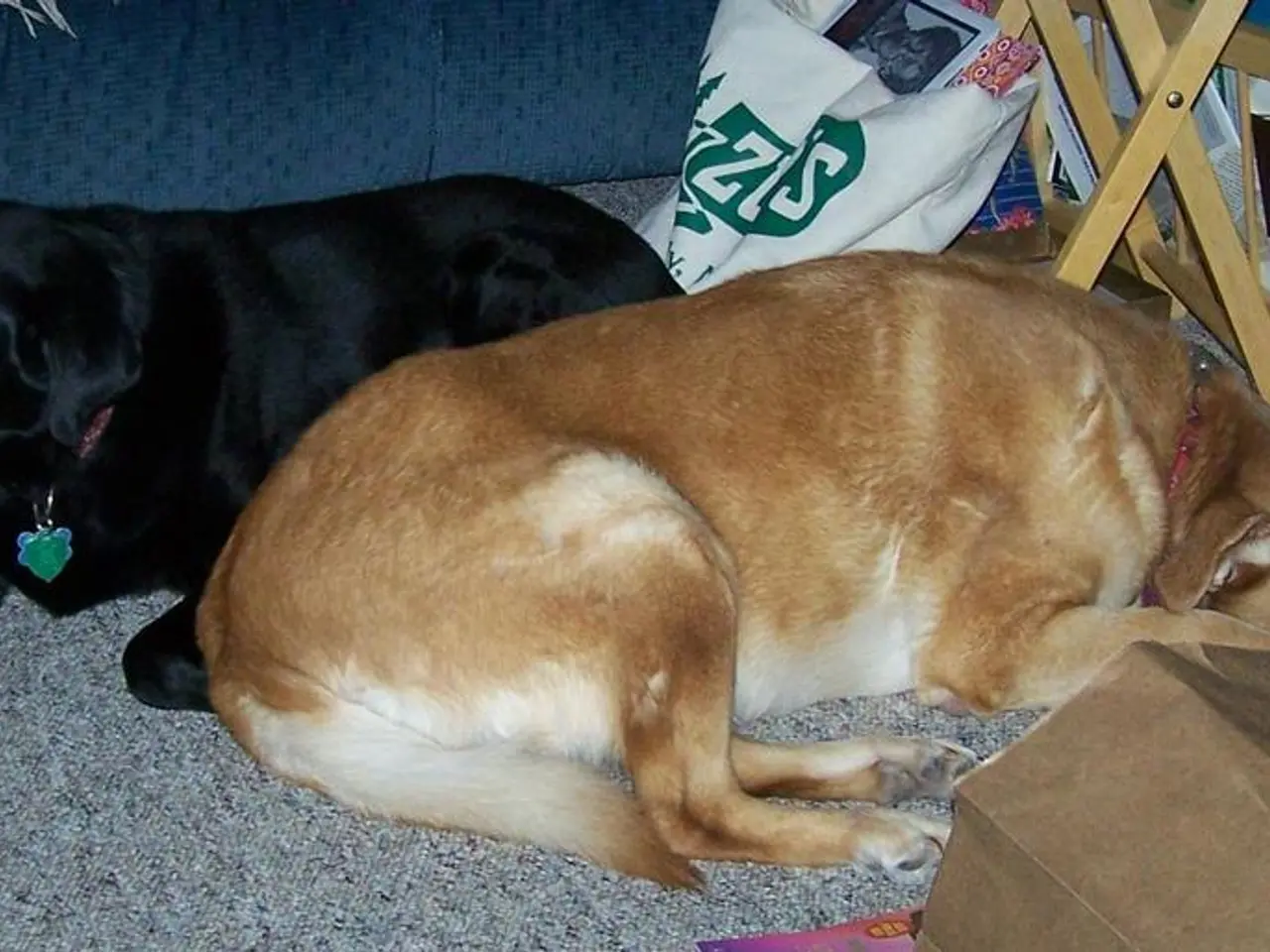Strategies to Prevent Your Dog from Feeling Envious of Your Newborn
In the joyous occasion of welcoming a new baby into the family, it's essential not to forget about your furry friend. Here are some tips to help your dog adjust to the changes and maintain harmony in your home.
According to a 2024 survey by insurers ManyPets, 36% of parents reported their dog becoming jealous since bringing a new baby home [1]. To prevent such instances, it's crucial to pay attention to your dog's behaviour and keep an eye out for any signs of anxiety or discomfort, such as lack of exercise or struggles with noise and changes to their routine [9].
One effective strategy is to maintain the dog's routine as much as possible. This includes keeping breakfast, dinner, and walk times the same as before the new arrival. Doing so can help a dog feel settled and less overwhelmed by the changes [6].
Preparing the dog in advance is also essential. This can involve familiarizing it with baby-related sounds, scents, and equipment, such as the baby's blanket or a muslin cloth that smells of the baby [7]. It's important to introduce the dog to the baby gradually, allowing them to sniff and gently get to know the baby, while discouraging unhygienic behaviors like face licking [6].
Giving a dog new toys can help keep them happy and occupied, especially interactive toys that provide mental stimulation [8]. Regular training sessions can provide one-on-one time with the dog and help prevent feelings of jealousy towards the baby [7].
Continuing regular attention to the dog is also vital, as dogs may feel anxious or excluded with the changes in family routine. Training refreshers and positive socialization while visitors come or during walks with the baby encourage good behavior and reduce stress in the dog [1].
While specific course materials and expert training programs are available to detail introductions and ongoing management between dogs and babies, the fundamental advice centers on gradual, positive exposure and maintaining the dog's sense of security and routine to minimize jealousy or anxiety [2].
If you're concerned about your dog's behaviour, it's always a good idea to consult a vet. Signs of jealousy in dogs can include whining, displaying attention-seeking behaviour, resource guarding, destructive behaviour, and unusual toileting habits [10].
In the author's case, they took several steps to ensure that their German Shorthaired Pointer, Maple, didn't display any jealous or anxious behaviours towards their baby. The author didn't force any interactions between the dog and the baby and instead introduced their baby to their dog in the right way by having their husband take a muslin cloth that smelled of the baby for the dog to have a good sniff before bringing the dog home [7].
The author also let their dog approach the baby's crib and have a sniff, rewarding the dog with treats to help the dog understand that the baby was nothing to become overly excited about [7]. The author desensitized their dog to baby sounds, sights, and smells before the baby's arrival by playing baby crying noises on their phone and spending time in the nursery [7].
The author provided their dog with their own safe space, such as using retractable baby gates, to ensure the dog knew they had somewhere to go where they wouldn't be bothered by the baby [7]. The author also went for a walk with an empty pram to get their dog used to walking nicely alongside a pram [7].
It's important to remember that every dog is unique, and what works for one may not work for another. With patience, empathy, and careful management, your dog can become a protective and affectionate companion to your new baby. However, never leave your dog unattended with your baby, as safety should always be a priority.
- In the case of a new baby arrival, it's crucial to understand that some dogs may become jealous, as indicated by a 2024 survey by ManyPets.
- To prevent such instances of jealousy, it's essential to observe your dog's behavior and be vigilant for signs of anxiety or discomfort.
- A strategy to manage this change is to maintain the dog's routine, ensuring consistent meal and walk times.
- Preparing the dog in advance is also vital, involving familiarizing it with baby-related items and gradually introducing it to the baby.
- Providing new toys can help keep the dog happy and occupied, particularly if they are interactive and provide mental stimulation.
- Regular training sessions can offer one-on-one time with the dog, while also helping prevent feelings of jealousy towards the baby.
- Continuing regular attention to the dog is important, as dogs may feel anxious or excluded with changes in family routine.
- If concerned about a dog's behavior, it's always advisable to consult a vet, who can help identify signs of jealousy in dogs, such as whining, attention-seeking behavior, and resource guarding.




